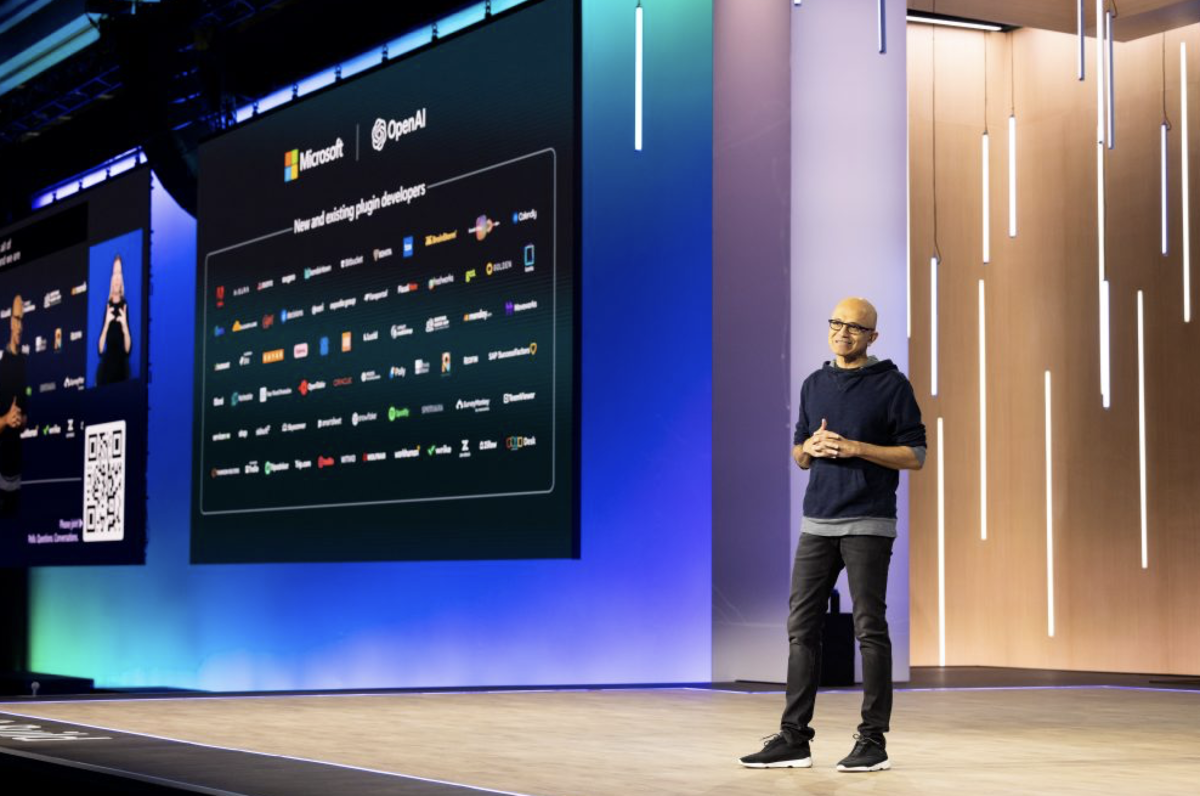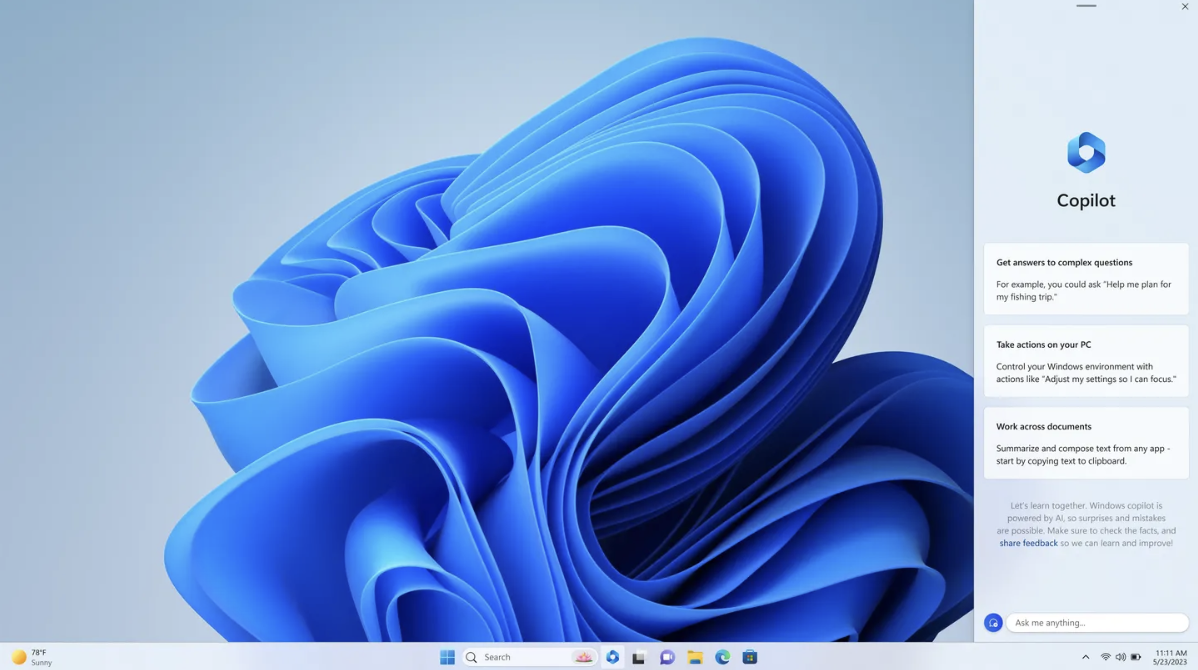Microsoft Build: Software giant continues its march towards AI-everything
Microsoft continues to make the most of its multi-billion dollar investment in OpenAI unveiling a suite of AI tools set to become key features of Windows 11, Microsoft 365 and its Bing search engine.
Microsoft’s Build 2023 conference for software developers held this week was dominated by AI-related product annoucements. The key ones included:

Satya Nadella at Build 2023
AI Copilot for Windows 11
Microsoft will integrate its AI assistant into the Windows 11 taskbar. Clicking on the icon fires up CoPilot which will serve two functions - allow you to issue prompts to adjust your computer settings, a potentially useful and quick alternative to navigating menus and system preferences.
It will also assist you with summarising, explaining and rewriting text in the app you are working in. Microsoft will begin testing this feature of Windows 11 publicly from next month.
Plugins for Microsoft 365
Copilot is coming to all of the Microsoft 365 applications, from Word to Excel and Powerpoint, offering potential productivity gains for millions of office workers. But at build, Microsoft also announced plug-in compatibility for 365 Copilot. Microsoft is using the same plug-in platform employed by OpenAI which will make life easier for developers.
Users will be able to use a plug-in to interact with content and data via Microsoft’s own Power Platform connectors, which are used to link to applications, as we well as Teams messages. You could, in theory, be working on a document in Word and ask CoPilot to summarise a discussion among colleagues that took place on Teams and simply embed it in the document.
But dozens of third-party plug-ins will also be available to work with Copilot, says Microsoft, opening up direct access to data from numerous platforms directly in Microsoft 365 with the AI assistant helping you make sense of it.
Integrating 365 Copilot into the Edge browser
Most of us are constantly switching between websites and documents as we do research to inform document writing. Microsoft has recognised that and is building 365 Copilot into its Edge web browser. The browser’s sidebar will feature 365 Copilot so you can work on productivity tasks while you have your browser open in front of you - as long as its the Edge browser anyway.
The real value here will be the ability to ask Copilot queries about content on the webpage in front of you and then be able to quickly integrate the response into the document, spreadsheet or presentation you are working on.
An AI upgrade for good old Windows Terminal
This one is for computer programmers, who will soon be able to use a chatbot that integrated with Github Copilot to auto-generate commands that can be used in Windows Terminal, the command-line app available on all Windows computers.
It could be used to explain errors and suggest various actions in Windows Terminal.

Copilot in Windows 11
Bing to power ChatGPT searches
To date, when you have been using ChatGPT via the OpenAI website, you’ve been drawing on a search engine to draw on results generated by the company’s large language model. That has meant recent content published to the internet hasn’t been included in responses ChatGPT generates.
That is changing, and ChatGPT Plus users will soon be able to set Bing as the default search engine used in ChatGPT - apaprently it will become available to users of the free ChatGPT service at some point too.
“ChatGPT will now have a world-class search engine built-in to provide timelier and more up-to-date answers with access from the web,” Yusuf Mehdi Microsoft’s head of consumer marketing wrote in a blog.
“Now, ChatGPT answers can be grounded by search and web data and include citations so you can learn more — all directly from within chat.”
That reinforces Microsoft’s bid to increase usage of its Bing search engine, which already has the AI chatbot built into it for general search queries at Bing.com
A couple of smaller announcements that will interest the developer community:
AI Hub: A new section in the Microsoft Store for the best AI experiences built by the developer community and Microsoft.
Dev Home: A new, developer-friendly dashboard for enhanced productivity for Windows developers.
What to make of the Build announcements?
Microsoft is accelerating its embrace of generative AI by leveraging its OpenAI partnership to embed AI features into its entire product line-up. It is also looking ot engrain use of AI in the Microsoft world by using plug-in capability to integrate a wide range of third party apps into Microsoft’s AI-powered environment. It’s a smart move.
Microsoft’s biggest and most ambitious task is establishing Bing as a force to be reckoned with in the search engine market. It sees AI as central to doing so. As Jessica Lessin, editor of The Briefing wrote this week:
“Microsoft is making a big play for the big kahuna: scoring the default search engine slot on the iPhone and other Apple products.
“This year Apple is set to renegotiate that deal, which Google currently pays billions for. And while Microsoft’s announcements may be technically cool, they aren’t going to move the needle for the fledgling search engine’s market position.
“A default search deal might, though. And there is a window of opportunity! The U.S. Department of Justice has sued Google over the current deal and other search practices. That case is scheduled to go to trial this fall.”
Microsoft is right at home in the world of business productivity and software development. It’s searhc engine and web browser have languished as nimbler rivals became the default incumbents.
The real coup would be making Bing and Edge genuine rivals to Google search and Chrome respectively. Microsoft has the momentum but Google isn’t going to sit by passively and hand over its leadership position in those markets.
